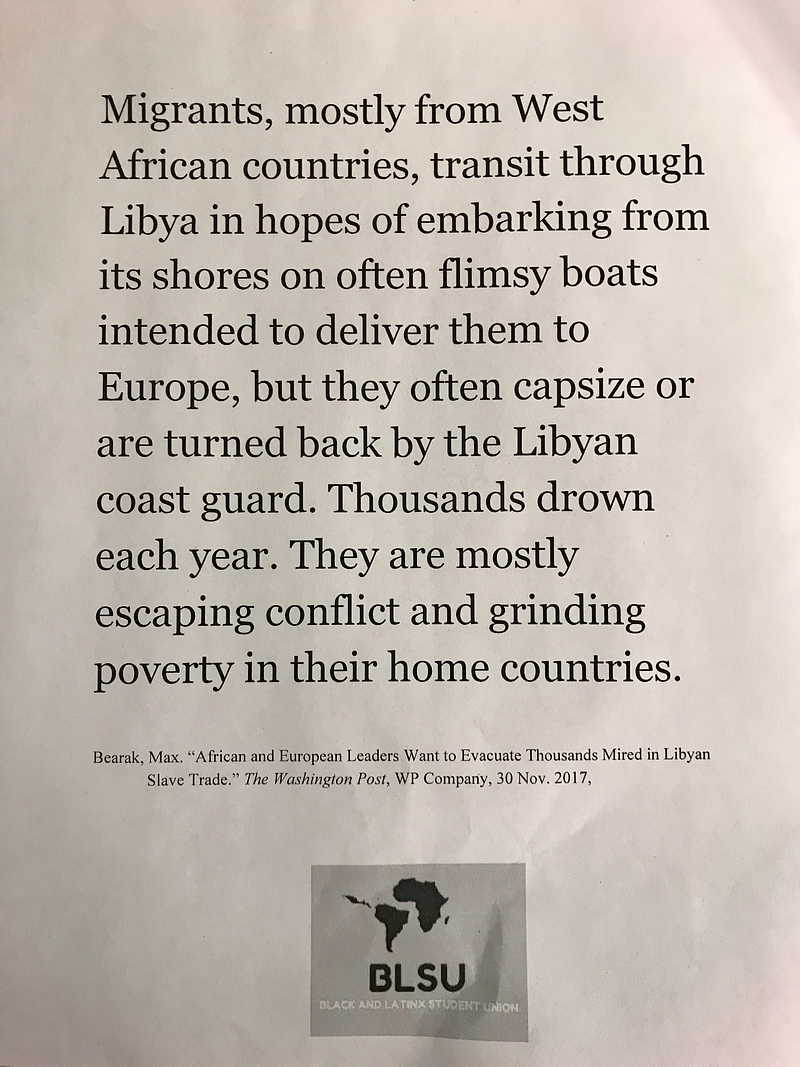
Issues of immigration and human displacement have recently been prevalent in the media, as it seems that new horrors of the refugee crisis are still coming to light even today.
Most notably,
CNN
published a video taken in December of this year of men being sold at an auction in Libya. These men are part of the hundreds of thousands of migrants and refugees feeling violence in the Middle East.
Thousands have died attempting this journey, and with European countries and the Libyan Coast Guard enforcing harsher regulations and inspections on boats, it is becoming harder for refugees to reach safety.
Instead, it is estimated that close to a million people are bottled up in Libya, overwhelming detention camps and living in abject conditions that leave them vulnerable to violent transgressions like robbery, rape, and murder.
The Hamilton College Black and Latinx Student Union (BLSU) has called for increased campus awareness on the tragedy of modern slavery in Libya and elsewhere abroad. Placing fliers in various buildings throughout campus and on Martin’s Way, the student group has advertised important facts and information about slavery abroad, including ways in which students can take action. Advocacy fliers call for students to “research, reveal and join the fight against slavery in Libya and elsewhere.”
Some suggested means of taking actions proposed by BLSU advocacy includes writing to the U.S. Ambassador to the United Nations and Libya, signing a global peition for the U.N. Security Council to take immediate action, and spreading the word to fellow students in classroom discussions.
These horrific conditions of slavery abroad are clear human rights violations and allow for even more exploitation of refugees and migrants; along travel routes to Libya and in Libya itself, slave markets are on the rise, taking advantage of this flow of human traffic.
Auctions where young men are sold off as laborers, abused by their owners and even killed, part of a vicious system of torment inherent in slavery and human trafficking, are commonplace in regions choked by an onslaught of refugees.
This refugee and migrant exploitation has been commonplace for years, with the European Union (E.U.) even taking steps to stem the flow of people from Libya and leaving them no choice but to return to the detention camps, the site of these human rights violations.
Only now, with the appearance of this video, have officials begun to take action. The prevalence of these slave auctions shocked E.U. and African leaders, who reached an agreement with Libya to allow for the evacuation of refugees in the detention camps.
Unfortunately, it oftentimes takes drastic events to trigger action from those who have the most power to affect positive change. When countries are faced with humanitarian issues that do not necessarily impact the wellbeing of their own citizens, a dangerous culture of apathy and passivity arises.
While we report on and direct all of our attention towards the problems of our country — the possibility of nuclear warfare with countries, the sexual harassment prevalent in our government and the entertainment industry, and various other topics, we often forget about the atrocities that take place everyday in other places.
When the media fails such places and, by association, the people in those places, it is often up to individuals to remain educated about global humanitarian issues.
Although it may feel like Hamilton students are far removed from such issues, and don’t really have the power to affect change, that’s not the case at all. The first step to change is knowing the facts.
BSLU member Edgar Otero ’19 commented on the groups politcal efficacy towards the topic. “BLSU is an organization that is not only concerned with the experiences of students of color at Hamilton, but we are also deeply committed to social activism and awareness of global issues that go ignored or unseen on our campus.
“As a collective, we decided that modern slavery and the Libyan slave trade are causes into which we can fully dedicate our time and energy, and this would be a way to fight campus apathy of these real humanitarian crises, which are so easy to turn a blind eye to on a college campus,” he said
“In an effort to raise campus awareness of this crisis, that everyone everywhere should care about, we hung posters up in as many spots on campus as possible which included information about the situation, such as facts and statistics, and also action steps that students can take to make a difference immediately.”
Otero added, “It is our hope that students and faculty included can take responsibility for educating themselves about the issue and inform their peers and colleagues as much as possible,” he added.
Students can contact the BLSU via email at [email protected] to become inovlved in the fight against slavery abroad.

















